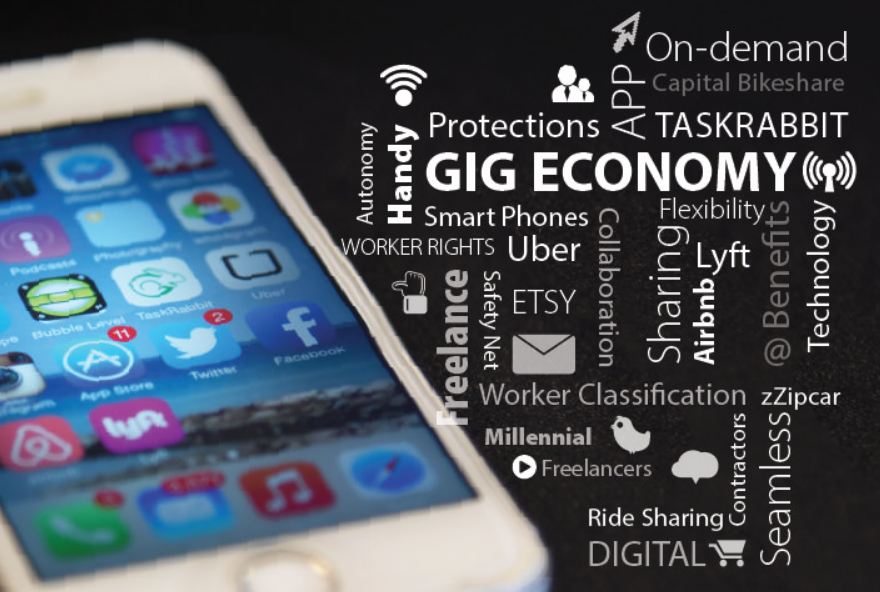Thanks to companies like Lyft, TaskRabbit and Instacart, it’s never been easier for Americans who can afford it to zip from place to place, get groceries delivered or let someone else walk their dog. Likewise, the number of Americans who are self-employed or independent contractors is soaring.
The share of Americans doing everything from accounting to driving as independent contractors rose from 10.7 percent in 2005 to 15.8 percent in 2015, according to a study by economists Lawrence Katz at Harvard University and Alan Krueger at Princeton University. The trend was more pronounced among women, they found, rising from 8 to 17 percent.
Based on my prior research regarding labor markets and job satisfaction, I wanted to know if this number was rising so fast partly because Americans enjoy the flexibility these jobs offer. To find out, I teamed up with a colleague of mine at Villanova University.
Greater flexibility
We already knew people take these jobs for many reasons, whether it’s as a primary source of income or as a side hustle.
Either way, many of these workers get enough flexibility on the job to give them some control over what they do and when they do it. That’s one reason why these arrangements are increasingly common, as a more recent study Katz and Krueger carried out suggests.
My colleague Mary Kelly and I analyzed data gathered through surveys conducted by University of Chicago researchers in 2006, 2010 and 2014 to compare job satisfaction levels among Americans with different kinds of occupations and employment status.
The approximately 3,600 people in this nationally representative sample included workers holding down regular jobs, as well as independent contractors and self-employed workers with some degree of control over their schedules. It also included contract employees lacking autonomy and flexibility, such as those working for temp agencies or with on-call obligations.
We also contrasted job satisfaction for employees in managerial or professional roles with workers in blue-collar occupations, and checked whether there were any differences for men and women.
More satisfaction
As you might expect, we found that people with more control over their schedules and who could choose to some extent which tasks they would take on are significantly more satisfied with their work than their peers who hold regular salaried jobs – despite losing out on benefits and security.
This satisfaction bump ranged between 6 and 8 percent for men and 4 and 8.5 percent for women. Perhaps surprisingly, this edge was bigger among people in nonprofessional jobs than for professionals.
And interestingly, women were generally more satisfied with jobs that gave them more control over their workdays than were men. That was true whether they were in professional occupations or had blue-collar status.
However, we detected no such added satisfaction for the workers without regular salaried positions, but whose jobs gave them little or no extra control over their responsibilities. Male and female employees in that situation were between 3 and 4.5 percent less satisfied with their work than their salaried counterparts.
To be sure, we cannot say exactly what it is about these jobs that Americans seem to find more satisfying. Most likely, different attributes appeal to different workers. For some it may be the flexibility, while for others it may be not being tied to a single employer. And some people, such as single parents or full-time students, may believe that these arrangements are the only way for them to work at all. Surely there are some aspects, such as having scant benefits and job security – or none at all – that they do not like, even if they find them satisfying in general.
But our findings do suggest that no matter how they make a living, American men and women are more satisfied with jobs that provide more control over their work day than with regular salaried jobs. We believe this signals that these kinds of jobs will probably keep growing.
 Cheryl Carleton does not work for, consult, own shares in or receive funding from any company or organisation that would benefit from this article, and has disclosed no relevant affiliations beyond their academic appointment.
Cheryl Carleton does not work for, consult, own shares in or receive funding from any company or organisation that would benefit from this article, and has disclosed no relevant affiliations beyond their academic appointment.



 Thailand Inflation Remains Negative for 10th Straight Month in January
Thailand Inflation Remains Negative for 10th Straight Month in January  Trump Signs Executive Order Threatening 25% Tariffs on Countries Trading With Iran
Trump Signs Executive Order Threatening 25% Tariffs on Countries Trading With Iran  Oil Prices Slip as U.S.–Iran Talks Ease Supply Disruption Fears
Oil Prices Slip as U.S.–Iran Talks Ease Supply Disruption Fears  Oil Prices Slide on US-Iran Talks, Dollar Strength and Profit-Taking Pressure
Oil Prices Slide on US-Iran Talks, Dollar Strength and Profit-Taking Pressure  Trump Lifts 25% Tariff on Indian Goods in Strategic U.S.–India Trade and Energy Deal
Trump Lifts 25% Tariff on Indian Goods in Strategic U.S.–India Trade and Energy Deal  BTC Flat at $89,300 Despite $1.02B ETF Exodus — Buy the Dip Toward $107K?
BTC Flat at $89,300 Despite $1.02B ETF Exodus — Buy the Dip Toward $107K?  FxWirePro- Major Crypto levels and bias summary
FxWirePro- Major Crypto levels and bias summary  Singapore Budget 2026 Set for Fiscal Prudence as Growth Remains Resilient
Singapore Budget 2026 Set for Fiscal Prudence as Growth Remains Resilient  Dow Hits 50,000 as U.S. Stocks Stage Strong Rebound Amid AI Volatility
Dow Hits 50,000 as U.S. Stocks Stage Strong Rebound Amid AI Volatility  Dollar Steadies Ahead of ECB and BoE Decisions as Markets Turn Risk-Off
Dollar Steadies Ahead of ECB and BoE Decisions as Markets Turn Risk-Off 
































